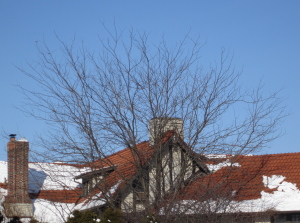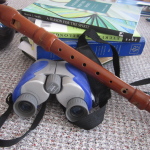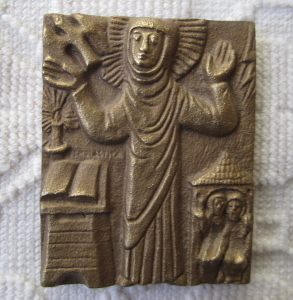
PHOTO:Mary van Balen
Sitting quietly, holding a cup of tea to warm my hands, I tried to enter into silence, greeting the morning, welcoming Presence. Breathe in. Breathe out. Breathe in. Breathe out. After ten minutes or so, I couldn’t help but focus on the birdsong coming from snow-blanketed tress and yards outside my building. Try as I might, I couldn’t let them go. “An invitation,” I decided.
Putting down the tea I opened the front door to see if I could spot the singers. Squinting my eyes against the bright light reflecting off all the white, I could see a small form or two on a tree a few doors down. I went inside, grabbed binoculars, slid my feet into slippers, and walked out the side door onto the driveway.
Cold, crisp air felt wonderful. Sun shine everywhere. Birdsong coming from every direction. “Sparrows,” I decided, on the trees over the red-tiled roof. “Cardinal.” The raspy bark of a woodpecker. Then, from somewhere out front, a clear, three-note call. I turned and followed the sound. Against the bright sun, only the bird’s silhouette could be seen. I began to hum along…three descending notes. “Lovely,” I thought, singing along. “What notes?”
I stepped back inside to find an instrument. The piano hadn’t made the transition into my apartment, residing now at my sister’s home in Ann Arbor. The guitar wasn’t tuned. Ah, the recorder, resting in its original hinged box, sat in front of a row of books in the glass-fronted case. Wrapped in scraps of pink and white flannel cut from pajamas decades ago, the pear wood instrument still produced warm tones as my fingers ran through the scale.

PHOTO:Mary van Balen
There were the notes: B above middle C, A, and G. Over and over. Like “Three Blind Mice.” I don’t know why I wanted to know the notes. Maybe to honor the little singer who helped fill the winter morning with hope. Hope of coming spring. Of life waiting for a thaw, prepared by cold and darkness to push up into daylight. I played the notes over and over. God-breath could sing through me today, if I let it. That’s the invitation.
One more look outside. The long icicle hanging from a downspout along the porch overhang was melting. Drop after drop formed at its tip, liquid light. Suddenly, it crashed into the snow beneath. The little bird had disappeared into a large tree across the street. It kept singing, now in tandem with the one called ‘hope’ that perched in my soul, as Emily Dickinson wrote, who wouldn’t stop at all.







 An
An









